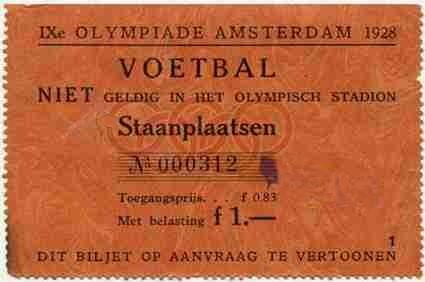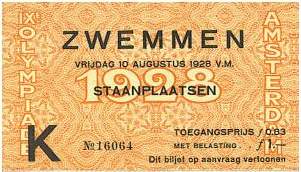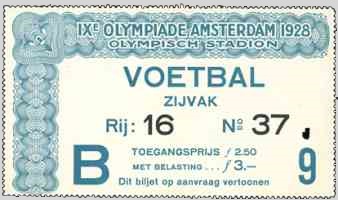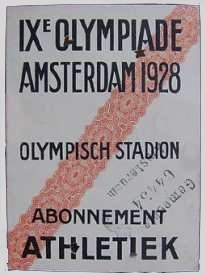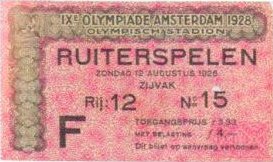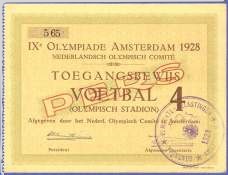Tickets
| Advance-Booking Office 1928
The Committee had considered a long time before
the Games were due to commence in what way tickets should be issued to
the public. In this connexion it was necessary to examine various points,
such as the desire of the public at home and abroad to timely secure seats
for certain sports; the desire of some people to attend all contests; the
necessity of always having tickets giving admission to one particular contest
available especially for foreigners; and finally the desirability for the
Committee to obtain soonest On the other hand, the Committee decided to introduce a system of transferable season tickets and also a system of day tickets. It was further decided to issue the season tickets at reduced prices compared with the aggregate price of the day tickets which would be necessary for any one wishing to attend all events. In respect of the day tickets the sports were divided into two groups, namely: 1. Sports in which each event constituted
one separate whole, such as
When this principle was definitely decided on a Section "Tickets" was instituted in the premises at the Weesperzijde, with Mr. W. A. H. HERMANS as secretary. This Section had nothing whatever to do with the financial matters connected with the tickets of admission; such matters being dealt with by the Section "Finance". The Section "Tickets" therefore had only to deal with the written, telephonic and personal applications for tickets; notifying applicants what reservations had been made; arranging and keeping a record of the season tickets allotted.
SEASON TICKETS: Following the example set by Stockholm on the occasion of the Games in 1912 it was decided to commence the issue of season tickets at home and abroad six months before the Games and stop the issue two months prior to the opening ceremony. During that period no applications for day tickets would be entertained. In order to advertise this arrangement the Section had hand-bills printed in different colours for each sport, showing the accommodation where the events in question were to be held and the prices of the season tickets. Except in the case of the football and hockey events, where the prices were still subject to alteration, the prices of the day tickets were also given on the bills so that the public might realise the advantage of purchasing season tickets Thousands of such bills were distributed at home and abroad. For publicity in Holland the Section also had posters made giving the same details; whilst the leading daily papers all did their best to advertise the advance sale of season tickets. By the courtesy of the Kiosk Company A. K. O. the coloured hand-bills just mentioned were further obtainable at all the Company's Kiosks. The hand-bills for abroad were sent to the national Olympic Committees, the international federations, and the travel offices. Despite all this publicity, applications for season tickets were far from up to expectations. By purchasing such tickets the public might have saved themselves the disappointments and the Committee the trouble with which the sale of day tickets is inevitably attended.
DAY TICKETS: When the time for receiving applications for season tickets had elapsed and it was decided to whom such tickets should be allotted, it was possible to commence preparations for the sale of day tickets. Complete sets of session, morning, afternoon, and evening tickets in various colours had been prepared and numbered some time previously. The tickets for the seats which had already been disposed of to season-ticket holders had to be removed from these sets. It is needless to add that such matters incurred much work especially as the greatest care had to be exercised.
As the bureau at the Weesperzijde was not centrally enough situated, and there was not sufficient room available for coping with the stream of applications expected, the Section was transferred to the premises at the Heerengracht, where it commenced operations on May 16th 1928. Another great advantage in the new quarters was the fact of there being a number of large safes in which the day tickets, representing an enormous amount, could be stored. The Section was first taken charge of by Mr. HERMANS, who was assisted by some 16 counter clerks. The various day tickets were dealt with in very much the same way as the season tickets. Written application had to be made to the Section, and the tickets allotted were obtainable a few days before the event in question. This method rendered it possible for a check to be kept on the enquiries and so eliminate the chances of speculation in tickets. All day tickets not sold in advance were placed on sale at the Stadium pay-boxes on the day of the respective event. (Source document: Official
report 1928, page 935)
Numbers of visitors: 665.600 |
